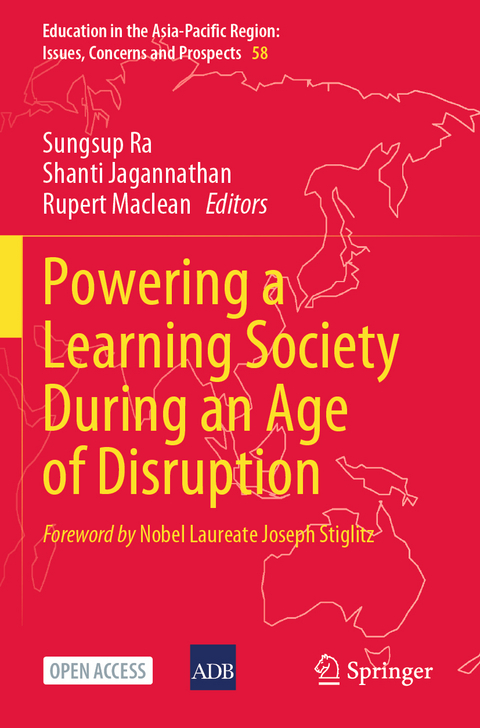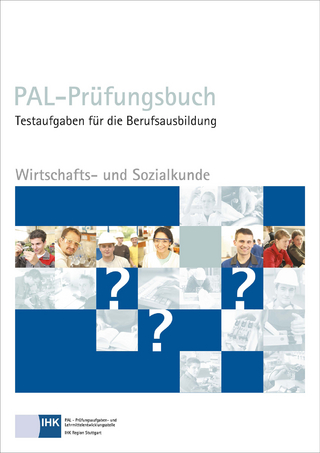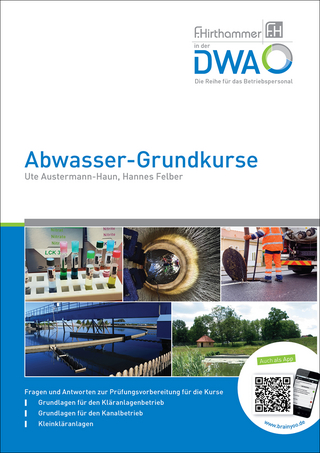
Powering a Learning Society During an Age of Disruption
Springer Verlag, Singapore
978-981-16-0985-5 (ISBN)
The book is a testimonial to the importance of ‘learning communities.’ It highlights the pivotal role that can be played by non-traditional actors such as city and urban planners, citizens, transport professionals, and technology companies. This collection seeks to contribute to the discourse on strengthening the fabric of a learning society crucial for future economic and social development, particularly in the aftermath of the coronavirus disease.
Sungsup Ra has over 25 years of experience across a broad range of development issues including education. As a strategic and innovative leader, he has led high level policy dialogue with developing countries and significantly contributed to Asian Development Bank’s (ADB) recent expansion in the education sector. He has introduced new financing modalities such as results-based lending to ADB. He pushed the boundaries of education operations to support cross sectoral issues such as food crisis, youth unemployment, digital transformation, clean energy, vulnerable urban population, and road safety through education and skills development projects. He is actively involved in global initiatives such as the International Financing Facility for Education, the Global High-tech Agricultural University Network, and the 17 Rooms initiative by the Brookings Institution. Dr. Ra has broad experience working with public and private entities such as Samsung and Korean National Pension. He also taught at leading universities such as International Christian University, The University of Tokyo, Korea University, and University of Illinois at Urbana-Champaign. He is currently Director of South Asia Human and Social Development Division and Chair of the Education Sector Group at ADB. Shanti Jagannathan has over 25 years of experience with reforms and transformation in school education, technical and vocational education and training and higher education in Asia. She has led policy research studies on skills for greening economies, Asia’s knowledge-based economies, and implications of industry 4.0 on education and training. Her recent work includes a guidance note on Education and the coronavirus disease (COVID-19) in Asia and the Pacific, designing and judging hackathons for digital reskilling and upskilling for displaced workers and digital platforms for education. She works on education sector policies and provides technical advice to ADB’s lending and knowledge partnerships for education. She has over a dozen publications from her work in ADB, including two previous books with Springer and special issues of the journals ‘Prospects’ and ‘International Journal of Training Research.’ She is currently Principal Education Specialist at ADB. Rupert Maclean AO is (concurrently) Adjunct Professor of International Education at Royal Melbourne Institute of Technology (RMIT) University, Melbourne; University of Tasmania, Hobart; Education University of Hong Kong; and University Tun Hussein Onn, Malaysia. He has held two United Nations Educational, Scientific and Cultural Organization (UNESCO) Chairs on Technical and Vocational Education and Training, one in Hong Kong, China, and the other in Qatar. Between 2007 and 2015 he was an Honorary Research Fellow, University of Oxford, Department of Education. In December 2018 he was appointed a consultant of the Belt and Road Alliance for International Applied Education and Training, People’s Republic of China. In 2011 he was awarded an Order of Australia (AO) in the Queen's Birthday Honours List for distinguished service to improving education and schooling in developing countries, particularly through UNESCO.
Chapter 1: Overview of Challenges and Characteristics of Learning Societies in an Age of Disruption.- Part 1: Developing Learn-Ability in an Age of Disruption and The Learning Crisis.- Chapter 2: Addressing the Syndrome of the Learning Deficit – Basic Skills and 21st Century Skills.- Chapter 3: Towards a New Global Compact on Student Learning Assessment.- Chapter 4: Title to be decided.- Chapter 5: Approaches to Improving Teacher Quality and Effectiveness – What Works and What Does Not?.- Part 2: Developing Specialist Skills: Post-Basic Education.- Chapter 6: Resilience and Growth: An HEI’s Response for Future-Proofing Graduates and Careers.- Chapter 7: Intensifying Skills Development for New Age Economic Development – Insights From The European Union.- Chapter 8: Quality Assurance for On-line Learning at Scale at The Institute of Cyber Education in Indonesia.- Chapter 9: Certification and Accreditation Innovations in Technical and Vocational Education and Training.- Part 3: Role of the Community in Learning.- Chapter 10: Playful Learning Landscapes: Convergence of Education and City Planning.- Chapter 11: Advancing Learning Cities.- Chapter 12: Citizen Surveys and Community Support to Learning.- Chapter 13: SkillsFuture and Citizen Ownership of Learning.- Part 4: Workplace Learning.- Chapter 14: New Directions for Workplace Based Training and Apprenticeship Training.- Chapter 15: Promoting Workforce Planning For The Rail Sector.- Chapter 16: Work Place Based Training in The European Union and The Experience of SkillMan.- Chapter 17: Work-Leaning Balance at Workplace.- Part 5: Role of Technology in Transforming Learning Societies.- Chapter 18: Coursera Partnership With Governments for Education and Skills For The Next Generation Learner and Workplace.- Chapter 19: Role of The Private Sector and Technology for Future-Ready Education and Training.- Chapter 20: Digital Platforms For Education and Training For The Future Workforce.- Chapter 21: How Can The Fourth Industrial Revolution Benefit Education?.- Chapter 22: Where Do We Go from Here? Conclusions and Future Pathways for Learning Societies.
| Erscheinungsdatum | 28.06.2021 |
|---|---|
| Reihe/Serie | Education in the Asia-Pacific Region: Issues, Concerns and Prospects ; 58 |
| Zusatzinfo | 55 Illustrations, color; 1 Illustrations, black and white; XVII, 321 p. 56 illus., 55 illus. in color. |
| Verlagsort | Singapore |
| Sprache | englisch |
| Maße | 155 x 235 mm |
| Themenwelt | Sozialwissenschaften ► Pädagogik ► Berufspädagogik |
| Sozialwissenschaften ► Pädagogik ► Erwachsenenbildung | |
| Schlagworte | applied learning • Equity and Justice in Education • Gender Issues in Education • Generic Skills • Inequality in Society • Learning Policy • Learning Societies • Lifelong Learning • open access |
| ISBN-10 | 981-16-0985-3 / 9811609853 |
| ISBN-13 | 978-981-16-0985-5 / 9789811609855 |
| Zustand | Neuware |
| Informationen gemäß Produktsicherheitsverordnung (GPSR) | |
| Haben Sie eine Frage zum Produkt? |
aus dem Bereich


